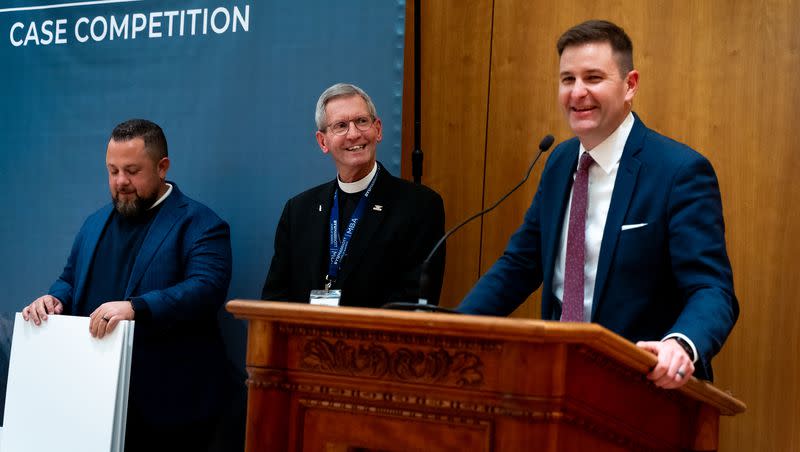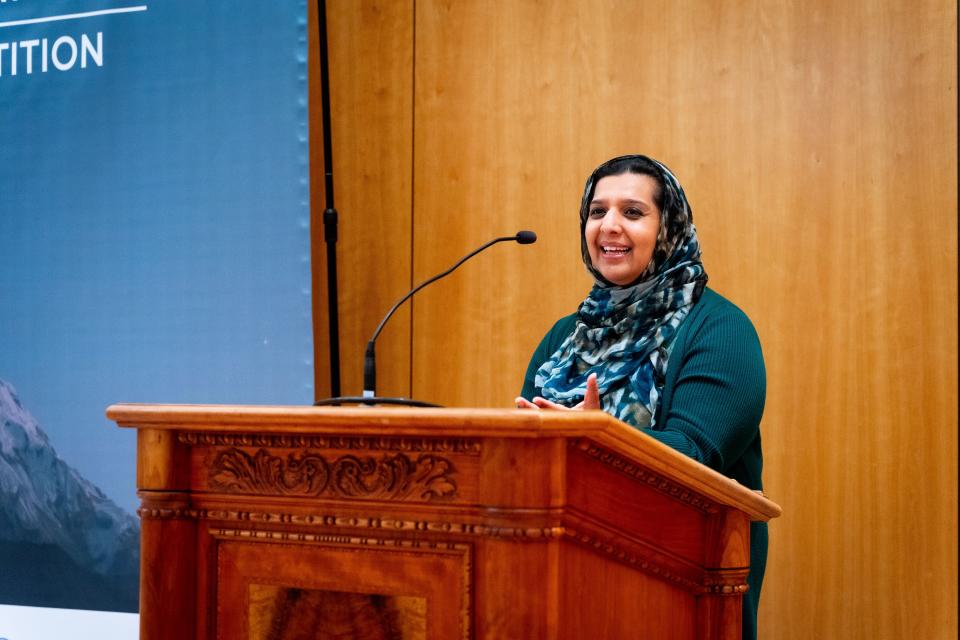Diversity, equity, inclusion … and faith?

As the corporate world moves toward embracing diversity, equity and inclusion initiatives, building a welcoming space for identities like race and ethnicity, gender and sexual orientation have taken center stage. But what about religious or spiritual inclusion?
In late February, Brigham Young University’s MBA program hosted teams from 10 universities to answer this question. The event, dubbed the Faith & Belief at Work Case Competition, pitted teams — comprised of four MBA students each — against one another to offer a solution to a real-world problem one company might face in implementing a faith-related DEI initiative.
The center of the competition was the idea that people of diverse backgrounds and faiths (or no faith) could collaborate in an environment in which faith is not viewed as something to be accommodated, but to be embraced.
“With the rise and attention on equity and ethics and justice and accessibility — and all these buzzwords that have the risk of just being buzzwords — we really only have to look as far as our faith teachings to know the solutions actually already exist,” said Sumreen Ahmad, the global change management lead at Accenture, in the event’s keynote address. “It’s up to us to live, model, and invite others.”

The genesis of the competition was last November, when four BYU students attended the Business Ethics Forum at Baylor University. In a similarly formatted event, the students participated in a case competition and were involved in social and networking events. Each meeting began with a prayer, and the students, who identified as Christians, Sikhs, Muslims or a number of other religious affiliations, spoke openly and frequently about their faith.
“We were just blown away,” Matt Young, an MBA student, said.
Upon returning to Provo, Young and his fellow students felt the need to do something similar at BYU. In a pluralistic society, they reasoned, every workplace or educational environment should allow all people — of any faith or no faith — to feel comfortable and welcome.
“We thought, if there’s anybody that should be promoting this, it should be BYU,” Young said.
Students and faculty sponsors from 10 MBA schools, including the University of Pennsylvania (Wharton) and Northwestern University (Kellogg), arrived in Provo midweek and were welcomed with a soda “mixer.” (“You don’t have to have alcohol to have fun,” Young said.) At 8 a.m. the next morning, teams were given the case prompt, and they worked on presentations until midnight. While students worked on the case, their faculty advisers went on tours of Temple Square and Welfare Square in Salt Lake City.
Throughout the two-day event, meetings began with prayer, and volunteers were requested. One was offered by a Latter-day Saint, another by an Evangelical. A Muslim student prayed in Arabic, and an atheist student offered a spiritual thought.
“Having been a part of corporate America for more than half of my life, now I’m seeing the culture shift that is happening to be inclusive of faith,” said Izzy Rivera, senior analyst of Legal Operations at Equinix, one of the event’s sponsors. “They don’t have to leave that checked at the door when they come into work.”
Rivera, along with several other event sponsors, was a judge for the case competition. Sponsors included BYU’s Sorensen Center for Moral and Ethical Leadership, PayPal, Sputnik Donuts and American Airlines (who offered two round-trip domestic flights to each member of the winning team).
The importance of embracing faith in the workplace is a matter of simple math, explained Father Greg McBrayer, chief flight controller and corporate chaplain for American Airlines. If someone begins a full-time job at 18 and retires at 65, he said, they will spend over 95,000 hours at work. If that person attends a two-hour church service each weekend, they will spend around 5,000 hours at church. It is essential to create a work environment where people of faith can live their faith, he explained, because it “creates a better employee, creates a better work environment and creates a better bottom line.”
“You cannot compartmentalize your work and your faith,” McBrayer said.
“I want people coming out of university to expect to see faith inclusion as a part of the culture of the companies (they will work for),” said Becky Pomerleau, director of PayPal’s SOX program.
Brian J. Grim, the founding president of the Religious Freedom & Business Foundation, said he expects this will be an annual event, with BYU taking the lead.
“That’s an indication of the commitment here, but also the interest across the nation,” Grim said.
